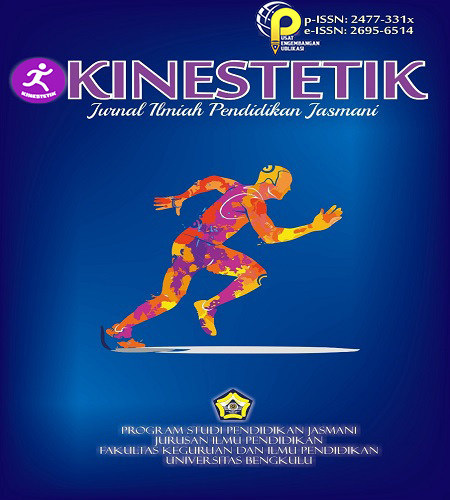Main Article Content
Abstract
Keywords
Article Details
- Authors retain copyright and grant the journal right of first publication with the work simultaneously licensed under a Creative Commons Attribution-ShareAlike 4.0 (CC BY-SA) that allows others to share the work with an acknowledgement of the work's authorship and initial publication in this journal.
- Authors are able to enter into separate, additional contractual arrangements for the non-exclusive distribution of the journal's published version of the work (e.g., post it to an institutional repository or publish it in a book), with an acknowledgement of its initial publication in this journal.
- Authors are permitted and encouraged to post their work online (e.g., in institutional repositories or on their website) prior to and during the submission process, as it can lead to productive exchanges, as well as earlier and greater citation of published work (See The Effect of Open Access).
- This work is licensed under a Creative Commons Attribution-ShareAlike 4.0 International License.
References
- Baticulon, R. E., Sy, J. J., Alberto, N. R. I., Baron, M. B. C., Mabulay, R. E. C., Rizada, L. G. T., ... & Reyes, J. C. B. (2021). Barriers to online learning in the time of COVID-19: A national survey of medical students in the Philippines. Medical science educator, 31(2), 615-626. https://doi.org/10.1007/s40670-021-01231-z
- Breinholt, A., & Jæger, M. M. (2020). How does cultural capital affect educational performance: Signals or skills?. The British journal of sociology, 71(1), 28-46. https://doi.org/10.1111/1468-4446.12711
- Chauhan, P., & Lal, P. (2012). Impact of information technology on reading habits of college students. International Journal of research review in engineering science and technology, 1(1), 101-106.
- Maharsi, I., Ghali, M. I., & Maulani, S. (2019). High school students' reading habit and perception on reading for pleasure. International Journal of Indonesian Education and Teaching, 3(1), 80-89. DOI: https://doi.org/10.24071/ijiet.2019.030108
- Nopiyanto, Y. E., Raibowo, S., Yarmani, Y., & Prabowo, A. (2021). Project Based Blended Learning To Improve Students Creativity In Sepak Takraw. Kinestetik: Jurnal Ilmiah Pendidikan Jasmani, 5(2), 300-309.
- doi: https://doi.org/10.33369/jk.v5i2.14542
- Nopiyanto, Y. E., Sutisyana, A., Raibowo, S., & Yarmani, Y. (2021). Blended Learning with Jigsaw in Increasing Interest, Motivation, and Learning Outcomes in Sports Sociology Learning. Kinestetik: Jurnal Ilmiah Pendidikan Jasmani, 5(1), 26-34.
- doi: https://doi.org/10.33369/jk.v5i1.13905
- Rowe, J. P., & Lester, J. C. (2015, June). Improving student problem solving in narrative-centered learning environments: A modular reinforcement learning framework. In International conference on artificial intelligence in education (pp. 419-428). Springer, Cham. DOI: 10.1007/978-3-319-19773-9_42
- Schoonmaker, R. G. (2014). A blended learning approach to reading circles for English language learners. University of Hawai'I Second Langauge Studies Paper 33 (1).
- Tarmi, T., Emzir, E., & Anwar, M. (2021, July). A Correlative Study Of Students’reading Interest Toward Exposition Writing Skill in The Tenth Grade of SMKN 3 Karawang. In International Conference on Education of Suryakancana (IConnects Proceedings). DOI: https://doi.org/10.35194/cp.v0i0.1582
- Tong, Y., & Wei, X. (2020). Teaching design and practice of a project-based blended learning model. International Journal of Mobile and Blended Learning (IJMBL), 12(1), 33-50. DOI: 10.4018/IJMBL.2020010103
- Yustina, Y., Syafii, W., & Vebrianto, R. (2020). The effects of blended learning and project-based learning on pre-service biology teachers’ creative thinking through online learning in the Covid-19 pandemic. Jurnal Pendidikan IPA Indonesia, 9(3), 408-420. DOI: https://doi.org/10.15294/jpii.v9i3.24706
- Zhang, L., & Chen, Y. (2021). A Blended Learning Model Supported by MOOC/SPOC, Zoom, and Canvas in a Project-Based Academic Writing Course. Research-publishing. net. https://doi.org/10.14705/ rpnet.2021.52.1272
References
Baticulon, R. E., Sy, J. J., Alberto, N. R. I., Baron, M. B. C., Mabulay, R. E. C., Rizada, L. G. T., ... & Reyes, J. C. B. (2021). Barriers to online learning in the time of COVID-19: A national survey of medical students in the Philippines. Medical science educator, 31(2), 615-626. https://doi.org/10.1007/s40670-021-01231-z
Breinholt, A., & Jæger, M. M. (2020). How does cultural capital affect educational performance: Signals or skills?. The British journal of sociology, 71(1), 28-46. https://doi.org/10.1111/1468-4446.12711
Chauhan, P., & Lal, P. (2012). Impact of information technology on reading habits of college students. International Journal of research review in engineering science and technology, 1(1), 101-106.
Maharsi, I., Ghali, M. I., & Maulani, S. (2019). High school students' reading habit and perception on reading for pleasure. International Journal of Indonesian Education and Teaching, 3(1), 80-89. DOI: https://doi.org/10.24071/ijiet.2019.030108
Nopiyanto, Y. E., Raibowo, S., Yarmani, Y., & Prabowo, A. (2021). Project Based Blended Learning To Improve Students Creativity In Sepak Takraw. Kinestetik: Jurnal Ilmiah Pendidikan Jasmani, 5(2), 300-309.
doi: https://doi.org/10.33369/jk.v5i2.14542
Nopiyanto, Y. E., Sutisyana, A., Raibowo, S., & Yarmani, Y. (2021). Blended Learning with Jigsaw in Increasing Interest, Motivation, and Learning Outcomes in Sports Sociology Learning. Kinestetik: Jurnal Ilmiah Pendidikan Jasmani, 5(1), 26-34.
doi: https://doi.org/10.33369/jk.v5i1.13905
Rowe, J. P., & Lester, J. C. (2015, June). Improving student problem solving in narrative-centered learning environments: A modular reinforcement learning framework. In International conference on artificial intelligence in education (pp. 419-428). Springer, Cham. DOI: 10.1007/978-3-319-19773-9_42
Schoonmaker, R. G. (2014). A blended learning approach to reading circles for English language learners. University of Hawai'I Second Langauge Studies Paper 33 (1).
Tarmi, T., Emzir, E., & Anwar, M. (2021, July). A Correlative Study Of Students’reading Interest Toward Exposition Writing Skill in The Tenth Grade of SMKN 3 Karawang. In International Conference on Education of Suryakancana (IConnects Proceedings). DOI: https://doi.org/10.35194/cp.v0i0.1582
Tong, Y., & Wei, X. (2020). Teaching design and practice of a project-based blended learning model. International Journal of Mobile and Blended Learning (IJMBL), 12(1), 33-50. DOI: 10.4018/IJMBL.2020010103
Yustina, Y., Syafii, W., & Vebrianto, R. (2020). The effects of blended learning and project-based learning on pre-service biology teachers’ creative thinking through online learning in the Covid-19 pandemic. Jurnal Pendidikan IPA Indonesia, 9(3), 408-420. DOI: https://doi.org/10.15294/jpii.v9i3.24706
Zhang, L., & Chen, Y. (2021). A Blended Learning Model Supported by MOOC/SPOC, Zoom, and Canvas in a Project-Based Academic Writing Course. Research-publishing. net. https://doi.org/10.14705/ rpnet.2021.52.1272
